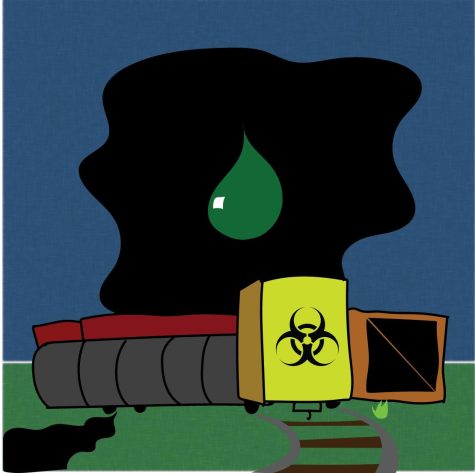Opinion: Why aren’t more people talking about East Palestine, Ohio?
April 12, 2023

The National Transportation Safety Board has not specifically stated the cause of the train derailment in East Palestine; however, it is clear through their investigation that an overheated wheel bearing contributed to the incident.
The Federal Railroad Administration does not have a system in place to regulate railroad companies like Norfolk Southern. The FRA lets railroad companies make their own rules regarding specific safety regulations. This shows the complete disregard the FRA has for safety. If there had been strict safety guidelines, this horrible incident may have never happened.
There will continue to be derailments if there are not more heat sensors in place along railroads to detect overheating wheel bearings. There should also be set temperature guidelines put in place by the FRA to force train drivers to stop the train before a derailment occurs.
This specific derailment in East Palestine is especially scary because hazardous chemicals were released into the environment, potentially affecting the health and safety of its residents.
On Feb. 3, a Norfolk Southern freight train derailed in East Palestine, Ohio. There were 150 rail cars that derailed. According to the United States Environmental Protection Agency (EPA), “Approximately 20 rail cars were listed as carrying hazardous material.”
There are sensors in place along railroads to detect if the train’s wheel bearings are getting too hot. The train that derailed in East Palestine encountered multiple heat sensors that showed one of the wheel bearings on the 23rd car was becoming hot, but it did not come to a stop because the rising temperatures were not over the limit required by Norfolk Southern.
A sensor in East Palestine sounded the alarm that one of the wheel bearings was extremely overheated, but according to the Congressional Research Service’s report, “it was too late to stop the train before it derailed.”
The FRA has regulations in place for trains carrying hazardous substances that must be followed. There are two different types of classifications for trains carrying dangerous materials: “Key Trains” and “High-Hazard Flammable Trains.”
The train that derailed in East Palestine was considered a “Key Train.” According to the Association of American Railroads, this means that the train has “20 car loads or intermodal portable tank loads of any combination of hazardous material.”
The AAR lists specific safety regulations that have been put in place regarding “Key Trains:” the train cannot exceed 50 mph; it must hold the main track at the meeting point if it does not meet the FRA Class 2 standards; the rail cars must have roller bearings; and if a train car triggers a sensor twice in a row, it has to be removed.
When the train derailed, the train was going 47 mph, according to the NTSB. This is technically below the maximum speed of 50 mph, but the train should have slowed down or stopped as soon as the crew realized one of the bearings on the 23rd car was overheating.
The NTSB revealed on Feb. 23 that the train passed three heat sensors and all three alerted the crew that the temperature of the bearing was getting hotter and hotter. The temperature of the bearing at the time of the derailment was 253 F above ambient.
Because the two previous heat sensors detected the bearing at 38°F and 103°F above ambient, the train was not brought to a stop.
According to the NTSB, above ambient temperatures between 170°F and 200°F indicate that the train needs to be stopped and checked out.
This has to be changed. If the crew had stopped the train the first time the heat sensors detected an increase in temperature, the derailment could have been prevented.
On Feb 6, Norfolk Southern burned the hazardous materials from the derailment in East Palestine to prevent any kind of explosion from happening.
The United States Environmental Protection Agency stated that the four different toxic chemicals released into the environment were butyl acrylate, ethylhexyl acrylate, ethylene glycol monobutyl ether and vinyl chloride.
These chemicals can all have negative effects on a person’s health, which is another reason why this train derailment is so serious.
The New York Times reported on Feb. 28 that residents of East Palestine “have complained of headaches, coughs, rashes and other classic symptoms of chemical exposure.”
This train derailment has brought to light the extreme lack of safety regulations in the railroad system. I deeply empathize with the people of East Palestine and hope that they receive some kind of compensation for having their whole world turned upside down.
I live less than a mile from railroad tracks and can hear train horns all day long from my home. I got chills when I first heard about this because I drive over train tracks every day. There has to be change, or more small towns like East Palestine could be affected by derailments.
The Bipartisan Railway Act of 2023 has recently been put forward by members of Congress to ensure that safety measures are put in place to stop train derailments.
President Biden released a statement regarding the legislation, saying that this bill would “increase safety by requiring hotbox detectors every 10 miles.”
If this bill is passed, it would change the railroad industry for the better by forcing railroad companies like Norfolk Southern to adhere to federal safety guidelines.
On March 14, the Associated Press reported that Ohio filed a lawsuit against Norfolk Southern demanding that they cover all of the costs for the damage the train derailment caused.
I hope that the state of Ohio wins this case and uses the money to help the people of East Palestine.
I encourage everyone to keep talking about the derailment in East Palestine and advocate for railroad safety. Here in Kern County, there are train tracks everywhere. It is not irrational to think that something like this could happen in our own neighborhood.





